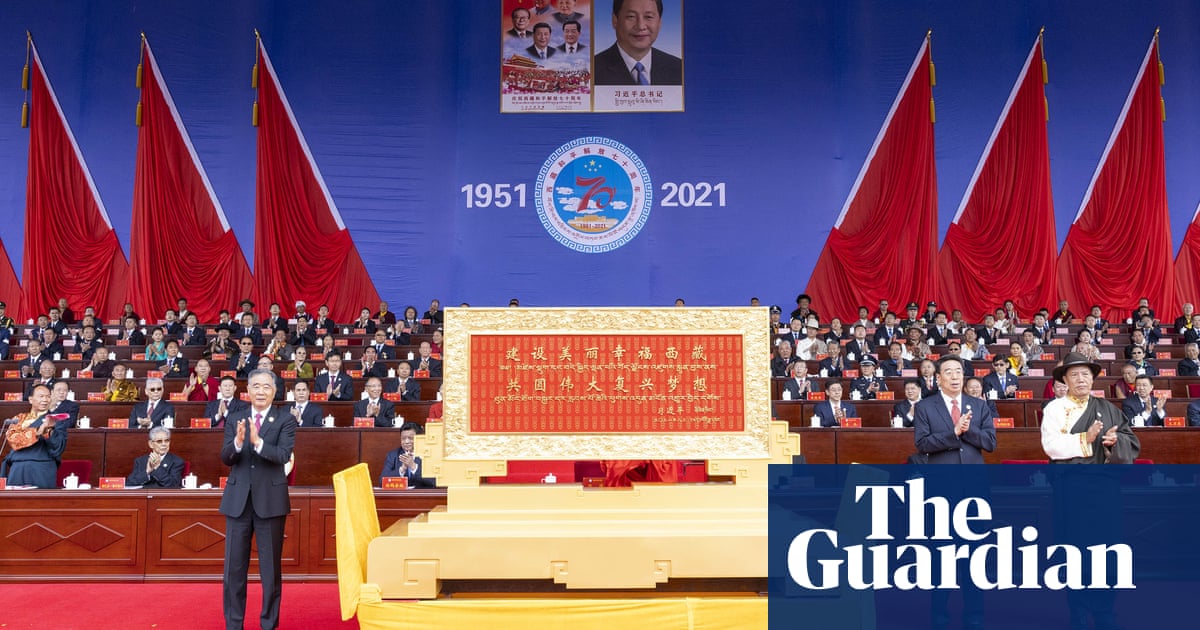All Tibetans should embrace Communist party rule and share the “cultural symbols and images of the Chinese nation”, a senior Chinese official has said at an event celebrating 70 years since the People’s Liberation Army invaded Tibet.
Wang Yang, a member of the politburo standing committee, China’s most powerful political body, made the remarks during a lavish ceremony in front of the Potala Palace in Lhasa, the sacred home of Tibet’s traditional Buddhist leaders.
It comes amid a crackdown on border regions home to ethnic minorities, such as Tibet, and the practice of non-Han cultures and religions.
According to the official state media outlet, the Xinhua news agency, Wang called for increased efforts to ensure all religions in China were “Chinese in orientation”, and said Tibetan Buddhism needed guidance in adapting to socialist society. He said Chinese culture was a bond that fostered togetherness.
“Only by following the [Chinese Communist party] leadership and pursuing the path of socialism, can Tibet achieve development and prosperity,” said Wang, according to Xinhua.
Wang’s comments mirror those he made in 2018 and align with ongoing Chinese government policies of assimilation in ethnic minority regions including Tibet, Xinjiang and Inner Mongolia, where punitive measures have sought to reduce the presence of local languages and cultures often dovetailing with crackdowns on alleged separatist activity.
In Tibet, authorities have jailed and allegedly beaten monks and nuns, subjected villages to political education sessions, jailed people who promoted local languages, enacted mass surveillance, restrictions on daily life and education, and labour programmes.
Authorities have promoted Mandarin in Tibet in what critics say is an attempt to erase culture. Mandarin is used in most Tibetan schools while the Tibetan language is taught as a subject. Similar efforts are under way in Inner Mongolia.
Thursday’s ceremony involved a reported 10,000 selected attendees, and marked 70 years since the invasion and subsequent establishment of the Tibetan Autonomous Region. The CCP maintains the invasion was a peaceful liberation of Tibetans from an oppressive theocracy.
In 1959 the Tibetan leader, the Dalai Lama, fled to India after an abortive uprising against Chinese rule, and his supporters have continued to document human rights abuses.
The region hosted close to 160 million tourists last year, according to Xinhua. Even before the coronavirus pandemic, China limited entrance to Tibet by foreigners.
Yaqiu Wang, a researcher for Human Rights Watch China, said there was no “70 years of peaceful liberation” in Tibet, only “ever-increasing brutal repression”.
“Seventy years after so-called ‘liberation’, the seemingly all-powerful Chinese Communist party still sees the beliefs and attitudes of ordinary Tibetans as a threat to its rule,” Yaqiu Wang told the Guardian.
“The Chinese government should understand that forced assimilation is no solution to the governance of ethnic minority regions. The denial of the right to free speech and assembly, and the denial of religious, language, cultural rights are in violation of the Chinese government’s international legal obligations.”
The event was heavily choreographed and replete with Communist party imagery including a four-storey portrait of Xi Jinping – a propagandistic practice that went out of fashion after the rule of Mao Zedong but which has begun to return under Xi’s rule.
The ceremony was extensively covered by state media, including nationwide broadcast and an international livestream, where hosts lauded the economic and infrastructure development of the region and the “seven decades of miraculous progress”.
In his speech Wang Yang said all officials and members of ethnic groups were to be mobilised “to forge an ironclad defence against separatist activities”.
“No one outside China has the right to point fingers at us when it comes to Tibetan affairs,” Wang said. “Any attempt or manoeuvre designed to separate Tibet from China is doomed to fail.”
